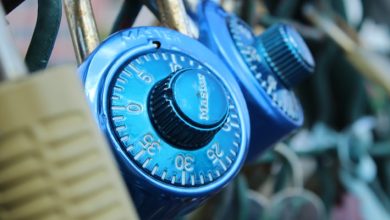The Essential Guide to Protecting Your Private Keys

- Understanding the importance of private keys in cybersecurity
- Best practices for generating strong and secure private keys
- How to securely store and backup your private keys
- Protecting your private keys from phishing and social engineering attacks
- Multi-factor authentication: Adding an extra layer of security to your private keys
- Recovering lost or compromised private keys: Tips and strategies
Understanding the importance of private keys in cybersecurity
Private keys play a crucial role in cybersecurity as they are used to secure sensitive information and data. In the digital world, private keys are essentially the equivalent of a physical key that unlocks a door. Without private keys, unauthorized access to confidential information is much easier, making it vital to protect them at all costs.
Private keys are used in various security protocols such as SSL/TLS, SSH, and encryption algorithms to authenticate the identity of users and ensure the confidentiality and integrity of data. They are unique to each user and should be kept private and secure to prevent any potential breaches or cyber attacks.
Understanding the importance of private keys in cybersecurity is essential for individuals and organizations to protect their sensitive information and prevent unauthorized access. By safeguarding private keys, you can mitigate the risks associated with data breaches and ensure the security of your digital assets.
Best practices for generating strong and secure private keys
When it comes to generating strong and secure private keys, there are several best practices that you should follow to ensure the safety of your sensitive information. Here are some key guidelines to keep in mind:
- Use a reliable random number generator to create your private keys. This will help ensure that they are truly unique and not easily guessable by potential attackers.
- Make sure to use a sufficient key length. Longer keys are generally more secure, as they provide a larger number of possible combinations for an attacker to guess.
- Consider using a passphrase along with your private key for an added layer of security. This can help protect your key in case it falls into the wrong hands.
- Store your private keys in a secure location, such as an encrypted hardware device or a secure digital vault. Avoid storing them on unsecured devices or in plaintext files.
- Regularly back up your private keys to prevent data loss in case of hardware failure or other unforeseen events. Keep these backups in a separate, secure location from your original keys.
- Avoid sharing your private keys with anyone else, as this can increase the risk of unauthorized access to your sensitive information.
By following these best practices for generating and protecting your private keys, you can help ensure that your valuable data remains secure and inaccessible to malicious actors.
How to securely store and backup your private keys
One of the most important aspects of protecting your private keys is securely storing and backing them up. There are several strategies you can employ to ensure the safety of your keys and prevent unauthorized access to your digital assets.
First and foremost, **encrypt** your private keys before storing them. This adds an extra layer of security and makes it more difficult for hackers to access your sensitive information. Additionally, consider **using** a **hardware wallet** to store your private keys offline. Hardware wallets are considered one of the most secure methods for storing private keys as they are not connected to the internet, making them less vulnerable to cyber attacks.
Another **important** **step** is to create **multiple backups** of your private keys. This will **protect** you in case you **lose** access to one of your backups. **Store** your backups in **different** **secure locations** to **minimize** the risk of **losing** all your private keys at once. **Consider** using **encrypted** USB drives or **paper wallets** to **store** your backups.
Regularly **check** your backups to ensure they are **up** to date and **accessible**. **Periodically** **rotate** your backups to **prevent** any **potential** **loss** of data due to **corruption** or **malware**. **Remember** to **never** **share** your private keys with anyone and **keep** them **private** at all times.
By following these **best** **practices**, you can **ensure** that your private keys are **securely** stored and backed up, **providing** you with **peace** of mind knowing that your digital assets are **protected**.
Protecting your private keys from phishing and social engineering attacks
To protect your private keys from phishing and social engineering attacks, it is crucial to stay vigilant and follow best practices. Phishing attacks involve tricking individuals into revealing their private information, while social engineering attacks manipulate individuals into divulging sensitive data.
One way to prevent falling victim to these attacks is to never share your private keys with anyone, regardless of who they claim to be. Be cautious of unsolicited emails or messages requesting your private keys, as this is a common tactic used by cybercriminals.
Another important step in protecting your private keys is to enable two-factor authentication whenever possible. This adds an extra layer of security by requiring a second form of verification before accessing your private keys.
Additionally, be wary of any requests for urgent action or information, as this is a common tactic used in phishing and social engineering attacks. Take the time to verify the legitimacy of the request before taking any action.
By remaining vigilant and following these best practices, you can significantly reduce the risk of falling victim to phishing and social engineering attacks and keep your private keys secure.
Multi-factor authentication: Adding an extra layer of security to your private keys
Adding multi-factor authentication to your private keys is a crucial step in enhancing the security of your digital assets. By requiring more than one form of verification to access your private keys, you create an extra layer of protection against unauthorized access.
Multi-factor authentication typically involves something you know (like a password), something you have (like a mobile device), and something you are (like a fingerprint or facial recognition). This combination makes it much harder for hackers to gain access to your private keys, even if they manage to obtain one of the factors.
Implementing multi-factor authentication is a relatively simple process that can be done through various apps and services. These tools generate unique codes that are required in addition to your password when logging in to your accounts. This added security measure significantly reduces the risk of unauthorized access to your private keys.
Recovering lost or compromised private keys: Tips and strategies
Recovering lost or compromised private keys can be a stressful and overwhelming experience, but there are several tips and strategies that you can use to help mitigate the damage and potentially regain access to your keys.
If you have lost your private keys, the first thing you should do is try to retrace your steps and think about where you last used or stored them. It’s also a good idea to check any backups or secure storage locations where you may have saved your keys.
If you suspect that your private keys have been compromised, it’s essential to act quickly to prevent any unauthorized access to your accounts or funds. You should immediately revoke the compromised keys and generate new ones to secure your assets.
One strategy for recovering lost private keys is to consult with a professional who specializes in data recovery or cryptography. They may be able to help you access or recreate your keys using advanced techniques and tools.
Another option is to reach out to the developers or support team of the platform or service where you used the keys. They may have protocols in place for recovering lost keys or may be able to provide guidance on how to proceed.
Overall, the key to recovering lost or compromised private keys is to act quickly, remain calm, and seek help from experts or support teams when needed. By following these tips and strategies, you can increase your chances of regaining access to your keys and securing your assets.



